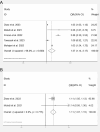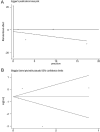Association of dietary inflammatory index and the SARS-CoV-2 infection incidence, severity and mortality of COVID-19: a systematic review and dose-response meta-analysis
- PMID: 38373980
- PMCID: PMC10877845
- DOI: 10.1186/s12937-024-00927-3
Association of dietary inflammatory index and the SARS-CoV-2 infection incidence, severity and mortality of COVID-19: a systematic review and dose-response meta-analysis
Abstract
Background: Several studies have reported the association between dietary inflammatory index (DII) and the SARS-CoV-2 infection risk, severity or mortality of COVID-19, however, the outcomes remain controversial.
Objective: We sought to examine whether a dose-response association of DII and SARS-CoV-2 infection exists.
Design: A dose-response meta-analysis was performed to investigate the association of DII and SARS-CoV-2 infection. We conducted a systematic search of PubMed, Embase and Web of Science up to March 15th, 2023. The odds ratios (OR) of DII and COVID-19 risk and severity were computed.
Results: Totally, 5 studies were included (1 from UK and 4 from Iran), consisting of 197,929 participants with 12,081 COVID-19 cases. Although there was heterogeneity among studies, the results indicated that higher DII was independently related to higher SARS-CoV-2 infection incidence (OR = 1.57, 95% CI: 1.14, 2.17) and COVID-19 severity (OR = 1.11, 95% CI: 1.07, 1.15) but not COVID-19 mortality (risk ratio = 1.13, 95% CI: 1.00, 1.27). The incidence of SARS-CoV-2 infection increased by 31% for each 1-point increase in the E-DII (OR = 1.31, 95% CI: 1.20, 1.43).
Conclusions: This meta-analysis suggests that an elevated DII score is associated with increased SARS-CoV-2 infectious risk and severity of COVID-19. There were not enough studies on COVID-19 mortality. Further large prospective studies in different countries are warranted to validate our results.
Keywords: COVID-19; Dietary inflammatory index; Incidence; Mortality; Severity.
© 2024. The Author(s).
Conflict of interest statement
The authors declare no competing interests.
Figures






Similar articles
-
Antibody tests for identification of current and past infection with SARS-CoV-2.Cochrane Database Syst Rev. 2022 Nov 17;11(11):CD013652. doi: 10.1002/14651858.CD013652.pub2. Cochrane Database Syst Rev. 2022. PMID: 36394900 Free PMC article.
-
Rapid, point-of-care antigen tests for diagnosis of SARS-CoV-2 infection.Cochrane Database Syst Rev. 2022 Jul 22;7(7):CD013705. doi: 10.1002/14651858.CD013705.pub3. Cochrane Database Syst Rev. 2022. PMID: 35866452 Free PMC article.
-
Physical interventions to interrupt or reduce the spread of respiratory viruses.Cochrane Database Syst Rev. 2023 Jan 30;1(1):CD006207. doi: 10.1002/14651858.CD006207.pub6. Cochrane Database Syst Rev. 2023. PMID: 36715243 Free PMC article.
-
The effect of sample site and collection procedure on identification of SARS-CoV-2 infection.Cochrane Database Syst Rev. 2024 Dec 16;12(12):CD014780. doi: 10.1002/14651858.CD014780. Cochrane Database Syst Rev. 2024. PMID: 39679851 Free PMC article.
-
Accuracy of routine laboratory tests to predict mortality and deterioration to severe or critical COVID-19 in people with SARS-CoV-2.Cochrane Database Syst Rev. 2024 Aug 6;8(8):CD015050. doi: 10.1002/14651858.CD015050.pub2. Cochrane Database Syst Rev. 2024. PMID: 39105481 Free PMC article.
References
Publication types
MeSH terms
LinkOut - more resources
Full Text Sources
Medical
Miscellaneous

